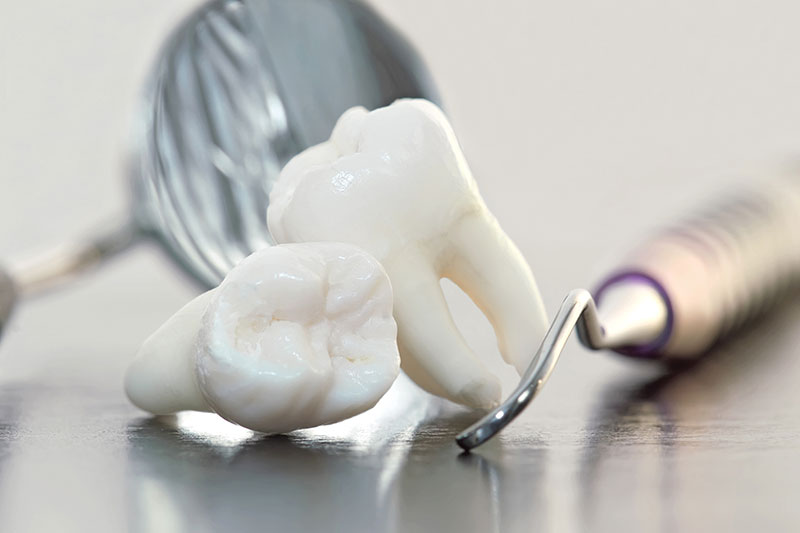
Although dental providers make every effort to save a patient’s tooth whenever possible, sometimes a tooth extraction is unavoidable. Tooth extraction may be simple or surgical, depending on certain characteristics of the tooth.
Fortunately, a tooth extraction doesn’t have to cause significant discomfort or derail your typical routine, and the options for replacing extracted teeth are remarkably lifelike.
To learn more about tooth extraction and explore options for replacing teeth that must be removed, schedule a consultation at Pinnacle Oral Surgery.
Why does my tooth need to be extracted?
A tooth may need to be extracted for several different reasons, both functional and aesthetic, including the following:
- Extensive decay
- Abscess or infection
- Impacted teeth
- Teeth damaged due to facial trauma
- Teeth that come in at an unusual angle
- Extra teeth
A dentist may first attempt to restore a tooth in such a scenario but may refer to an oral surgeon for extraction if restoration efforts fail.
What are the different types of tooth extractions?
Tooth extractions are either non-surgical or surgical. Non-surgical extractions remove teeth that have erupted completely into the smile in the correct position. After the site is numbed and the tooth loosened, the oral surgeon will use forceps to apply force to the tooth and remove it.
Surgical extractions are more complex. This approach is indicated for impacted teeth, such as wisdom teeth. Surgical extractions may also be used for extra teeth or teeth that erupted at an unusual angle. In a surgical extraction, the oral surgeon usually will remove the surrounding bone before removing the tooth.
All extractions use local anesthetic, and for surgical extractions, patients can also choose sedation for maximum relaxation and comfort.
How will I heal from my tooth extraction?
You should expect the tissue healing at the extraction site to take a week or two. The soft tissue should regenerate during this time, and bone will begin to fill in the empty socket. You may need to make minor lifestyle changes, such as altering your diet or avoiding vigorous activity, during this time.
There is a risk of certain complications associated with extractions, although that risk is low. You can also take steps to minimize these risks so that you don’t experience an extended recovery period.
Our team at Pinnacle Oral Surgery will give you detailed instructions on how to care for the extraction site. We urge you to follow these instructions closely to minimize your risk of complications and have an uneventful recovery.
What are my options to replace extracted teeth?
Different tooth replacement appliances will be suitable for different circumstances. The possible options include:
Fixed dental bridges (for a single missing tooth or a stretch of multiple extracted teeth)
Dental implants (for anything from a single tooth replacement to an entire arch)
Partial dentures (for multiple extracted teeth)
Complete dentures (for an entire arch of missing teeth)
Certain considerations will influence the type of tooth replacement that will be most appropriate after your extraction. We can discuss the options with you in greater detail at your consultation.
FAQs about Tooth Extraction
Barring any complications after the extraction, patients usually can resume their normal routines within a few days of an extraction. The recovery period is shorter for simple extractions than for surgical ones.
The team at Pinnacle Oral Surgery prioritizes patient comfort in all treatments, including tooth extractions. In addition to administering a local anesthetic at the extraction site, your oral surgeon may also recommend sedation, especially if the extraction is a surgical one.
After the anesthetic and sedatives wear off, patients may experience some minor discomfort in the first 48-72 hours after the extraction. This symptom usually can be managed using over-the-counter painkillers. If your pain persists beyond three days, follow up with our office as soon as possible for further evaluation.
Tooth extraction does have consequences for the smile. If the extracted tooth is not replaced, the patient may experience bone loss. Additionally, any remaining teeth in the smile may shift from their proper positions to fill in the empty space. That process can damage teeth and have an unattractive effect on your smile. To avoid these effects of tooth loss, patients should plan for tooth replacement following their extraction.
The nature of the tooth extraction will vary from patient to patient. Accordingly, the associated costs will vary, as well. Factors that influence the cost of extraction may include:
- Type of extraction (surgical or non-surgical)
- Number of teeth being extracted
- Imaging needed to plan treatment
- Optional sedation
We work closely with our patients to make the most of any insurance coverage that they may have. Our billing staff has years of expertise in identifying insurance coverage. We also accept multiple forms of payment to help you manage any out-of-pocket costs that you may face as a result of your extraction.
